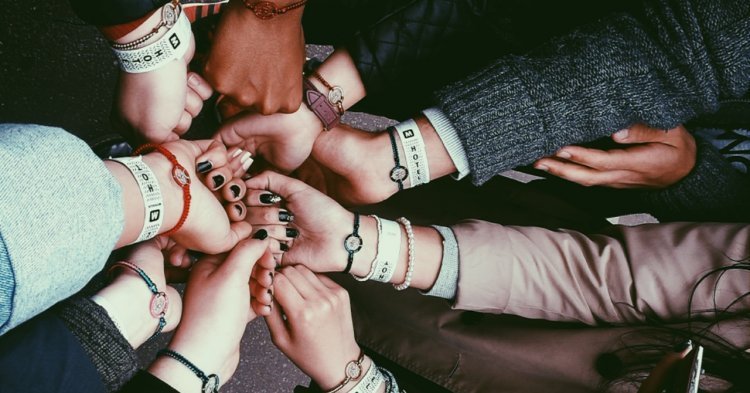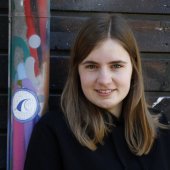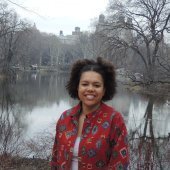It is noon; the sun beats down on the streets of the city centre whilst buses and cars trundle by. We all know it all too well. People hop on and off, wait, fill the alleys and meander through the masses. Everyone has their own destination, focused only on themselves, sunk in their own world. I myself am an observer and yet also a part of this messy crowd. But how is it that I’m not just me, but part of this “other” as well? What is it that makes me part of the whole?
“Zoon politikon”, a social and political being, was the term used by the Greek philosopher Aristotle to describe a human being. Living in groups or states, humans rely on communication and emotional closeness, making them a communal being. The first community we get to know is usually the family. Later, classes in schools, neighbourhoods, sport clubs or even religious or political communities are added to that list, as well as social media, gaining more and more importance in recent years. Our own identity is shaped by these communities. The sum of them, each in its different form and shape, is what we refer to as society. Society is diverse, colourful and continuously changing.
Without society every human would constantly be in danger, since each would think of their own advantage first and foremost. The English philosopher Thomas Hobbes describes such circumstances as the following: “The man is a wolf to man”. A fairly pessimistic view. To put an end to the fighting of everybody against everybody and to ensure peace, humans agreed to form a state, to whom they gave power of disposition.
But how was such a political community to be designed? Contrary to animals, humans, at least theoretically, may decide upon the rules regulating their coexistence themselves. In reality, however, not everyone can partake in the decision on how the society in which one lives is shaped. To what extent one’s views are taken into consideration largely depends on the governance of the respective state. In democracies we have significantly more influence on politics than in authoritarian regimes, in which only the leaders are granted such powers.
Ideally, we can decide for ourselves how we wish to live our lives, and which moral code we subscribe to. Of course, everyone has different interests and strengths, but we desire a fair society in which all are treated equally. Thus, we need to continuously renegotiate the laws that we give ourselves. A balance has to be found so that every member of society is equally and fairly treated, and able to develop freely.
The American philosopher John Rawls addressed the question of how to design a fair society as well. He came up with the now-renowned “veil of ignorance”. He suspected that fair and impartial results would become more likely if the people involved did not now their place in society. In such a manner it would be much more probable for wealth and prosperity to be distributed equally. In reality, however, we are distinct persons within a society: a student, a son, a daughter, rich or poor. We come from different parts of the world, speak different languages and have grown up in different cultures. We all define “good” and “bad” differently. Against this backdrop we need to remind ourselves of this pluralism and thus tolerate other, different opinions and lifestyles. Especially in times of globalisation like ours, we cannot afford to seal ourselves off. Instead we need to communicate more than ever and agree on some shared values. For the global community this could, for example, be human rights, which each and every one of us is theoretically entitled to. Still, there are many countries in which they are violated, and many liberties are not granted.
Nevertheless, all members of society should have equal opportunity for self-realisation without coercion. In such an individualistic society everyone may live life as one pleases. According to Jean-Paul Sartre, a French philosopher, humans are whatever they make of themselves. One’s personality and nature can thus be defined by the individual themselves. This freedom in turn also means more responsibility that individuals now have to take for themselves and their actions. Moreover, each person carries some responsibility for nature and humanity as well. Since the community depends on us, we need to assume these responsibilities too. We can do so, for example, by voluntary engagement and supporting those who advance our society in a desirable direction. Within our families or in clubs we can also contribute to the greater good. It is not enough to simply think of ourselves; in a community everyone should be ready help each other.
Your actions, mine and ours together, can, carried out by ourselves or jointly, shape the world. By ourselves we can initiate big changes, but as a community we are able to move mountains. It is only together that we can create pressure to change the whole world. In politics and economics things only evolve when forced by the masses. Together we are in a position to tackle problems such as inequalities, humanitarian catastrophes and the pollution of our environment. In turbulent times like ours it is more important than ever to debate the society we and future generations wish to live in and embrace the controversy. Only in such a manner can we eventually arrive at the best solutions that grant all individuals the freedom to pursue their own interests.
Just like we shape our society, society shapes us.
This article was originally published in the student newspaper Blickkontakt. Blickkontakt is a partner of Treffpunkt Europa, The New Federalist’s German-language sister edition.



Follow the comments: |
|
